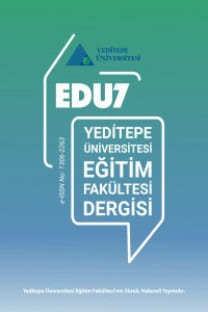EFL Teachers’ Perceptions of Professional Development
EFL teachers, professional development
EFL Teachers’ Perceptions of Professional Development
EFL teachers, professional development,
___
- Alan, B. (2003). Novice teachers’ perceptions of an in-service teacher training course at Anadolu University. Bilkent University, Ankara, Turkey.
- Alibakhshi, G., & Dehvari, N. (2015). EFL Teachers' Perceptions of Continuing Professional Development: A Case of Iranian High School Teachers. Profile issues in teachers professional development, 17(2), 29-42.
- Day, C. (1999). Developing teachers: The challenges of lifelong learning. London, England: Falmer Press.
- Eksi, G. & Aydın, Y. Ç. (2012). English instructors’ professional development need areas and predictors of professional development needs. Marmara University, Goztepe Kampusu, Istanbul, Turkey.
- Gultekin, İ. (2007). The analysis of the perceptions of English language instructors at TOBB University of Economics and Technology regarding in-set content. Middle East Technical University, Ankara, Turkey.
- Karaaslan, D. (2003). Teachers’ perceptions of self-initiated professional development: A case study on Baskent University English language teachers. Middle East Technical University, Ankara, Turkey.
- Lin, S.-c., Cheng, W.-w., & Wu, M.-s. (2015). Uncovering a Connection between the Teachers’ Professional Development Program and Students’ Learning. Journal of Education and Practice, 66-74.
- Maria, M., & Garcia, I. (2016). Informal online communities and networks as a source of teacher professional development: A review. Teaching and Teacher Education, 291-307.
- Mahmoudi, F., & Özkan, Y. (2015). Exploring experienced and novice teachers’ perceptions about professional development activities. Procedia-Social and Behavioral Sciences, 199, 57-64.
- Mizell, H. (2010). Why professional development matters. Oxford, OH: Learning Forward.
- Ozen, G. (1997). A needs assessment of in-service teacher training programs for professional development at the freshman unit of Bilkent University. Bilkent University, Ankara, Turkey.
- Richards, J. C., & Farrell, T. S. C. (2005). Professional development for language teachers. New York, NY: Cambridge University Press.
- Sentuna E. (2002). Interests of EFL Instructors in Turkey regarding INSET content. Bilkent University, Ankara, Turkey.
- Yayın Aralığı: Yıllık
- Başlangıç: 2006
- Yayıncı: Yeditepe Üniversitesi
Okul Yöneticilerinin Bilgi Yönetimine İlişkin Yaklaşımları
Mehmet ÖZDOĞRU, Vicdan ALTINOK
EFL Teachers’ Perceptions of Professional Development
Cansu ALPSOY, Özden OĞUL, Deniz TÜRKDOĞAN
Büşra YÖRÜK, İzim TÜRKER, Elifnaz ÖZEN, Dila ÖZBOZDOĞANLI, Müge MÜEZZİNOĞLU, Deniz FINDIK, Alpcan BİLECEN, Yelkin DİKER COŞKUN
Bellek ve Bilinç: “Şimdi, Burada, Halikarnassos’ta” Lirik Bir Şair Emrah Pelvanoğlu
Devlet Üniversitesi İngilizce Hazırlık Öğrencileriyle Bir İhtiyaç Analizi Çalışması
Münire ERDEN, Ayşe YILMAZ VIRLAN, Bahadır TANYOLAÇ, Emel KARAKUŞ, Eray SEVİNGİL, Görkem SATAK, Hüseyin TÜRKOĞLU, Meltem İPEK ÖNER
Öğretmen Adaylarının Yenilikçlik Algılarını Etkileyen Etkenler Üzerine Nicel bir Araştırma
Mehmet Ali ÇORLU, Emin AYDIN, Kamil Arif KIRKIÇ
Kitap İncelemesi Bellek ve Bilinç: “Şimdi, Burada, Halikarnassos’ta” Lirik Bir Şair
